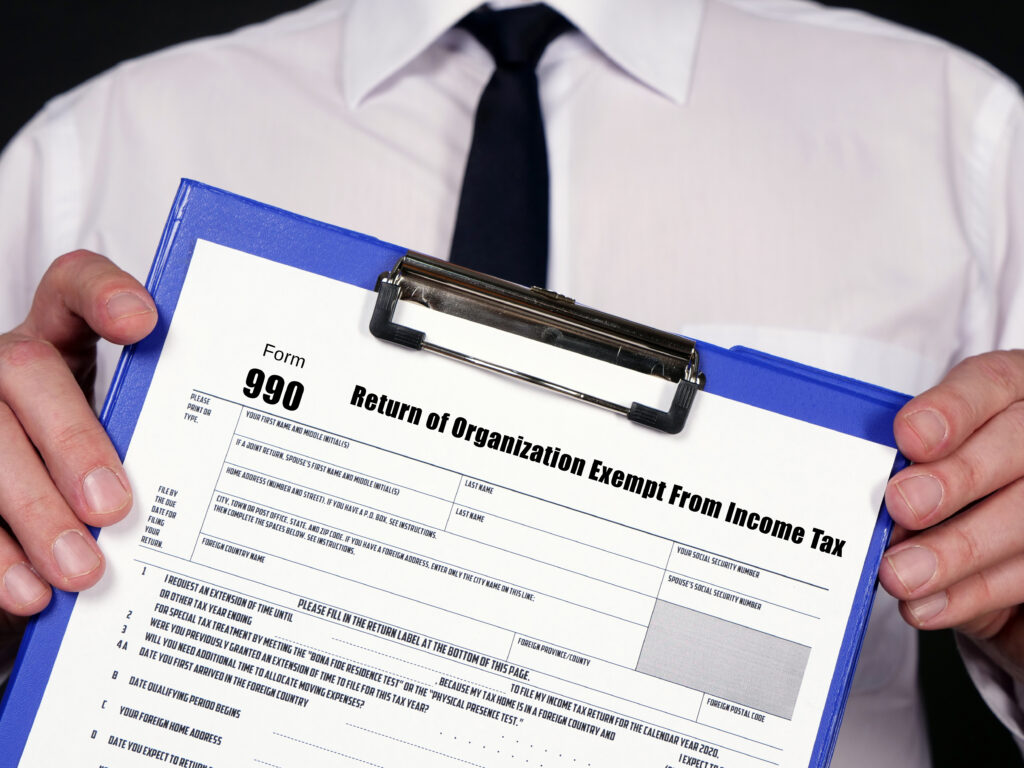Last updated on: May 20, 2025
For nonprofits, staying compliant with IRS regulations isn’t optional—it’s essential for maintaining tax-exempt status and preserving public trust. A critical part of compliance is filing Form 990 annually. This form not only provides transparency about your finances and operations but also ensures your organization remains in good standing with the IRS. Failure to file can lead to significant consequences, including fines, loss of tax-exempt status, and even organizational dissolution.
What Happens When You Don’t File Form 990?
A nonprofit that is required to file Form 990 and does not can face fines and penalties, possible loss of tax- exempt status, or dissolution.
Fines and Penalties: The IRS imposes financial penalties on nonprofits that fail to file Form 990 on time:
- For smaller organizations (gross receipts under $1 million): A penalty of $20 per day, up to a maximum of $10,000 or 5% of the organization’s gross receipts, whichever is less.
- For larger organizations (gross receipts over $1 million): A penalty of $100 per day, up to a maximum of $50,000. These fines can add up quickly and divert funds away from your mission.
Loss of Tax-Exempt Status: The most severe consequence of failing to file Form 990 for three consecutive years is the automatic revocation of your tax-exempt status. Losing this status means:
- Your organization will need to pay corporate income taxes.
- Donations to your organization will no longer be tax-deductible for donors, making it harder to attract funding.
- Reinstating tax-exempt status requires reapplying to the IRS, which can be a lengthy and costly process.
Reputational Damage: Noncompliance can raise red flags with donors, stakeholders, and grantors. A revoked tax-exempt status may signal mismanagement, eroding trust and financial support. Reputational damage may also affect the nonprofit’s relationship with the community. Without tax-exempt status, the nonprofit would be limited in its programs and services.
Potential Organizational Dissolution: If a nonprofit is unable to recover from penalties, the loss of funding, and reputational harm, it may face dissolution. This is particularly likely for smaller nonprofits without robust financial reserves
How to Avoid Noncompliance
Know Your Filing Requirements: The type of 990 form you file depends on your organization’s size and gross receipts:
- Form 990-N (e-Postcard): For organizations with gross receipts under $50,000.
- Form 990-EZ: For organizations with gross receipts under $200,000 and total assets under $500,000.
- Form 990: For larger organizations.
File on Time: The deadline is the 15th day of the fifth month after the end of your fiscal year. For example, if your fiscal year ends on December 31, your Form 990 is due by May 15.
Seek Professional Help: Working with a compliance expert can help you navigate filing requirements and avoid costly mistakes.
Stay Compliant With BryteBridge
Filing Form 990 doesn’t have to be stressful. At BryteBridge, we specialize in nonprofit compliance, ensuring your organization stays on track with IRS regulations.
Contact a BryteBridge consultant today by calling 877-857-9002 to learn how we can handle your Form 990 filing and keep your nonprofit in good standing.
Don’t let noncompliance jeopardize your mission—let us help you stay compliant, transparent, and focused on making an impact!



